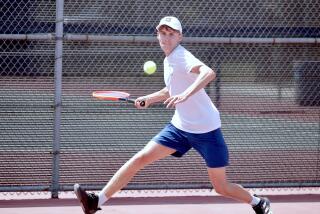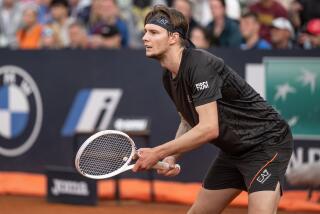COSTA MESA : Table Tennis Meet Lures Top Players
- Share via
John Ryan enjoys nothing more than a good match of table tennis. So on Sunday, he drove nearly 70 miles from his home in Palmdale to Costa Mesa to watch some of the world’s top-ranked players compete for $8,000 worth of prizes in the Econo Lube N’ Tune Pacific Coast Open held at Orange Coast College.
“I love to play the game,” Ryan said. “I practice every day and even competed in some tournaments, but watching these guys lets me know that I have a long way to go.”
The two-day event featured 220 players from around the country, including the current men’s and women’s U.S. champions, Sean O’Neill and Insook Bhushan.
“It’s probably one of the toughest tournaments I participated in,” said O’Neill, who traveled from Pittsburgh. “Whenever you play with players from the international circuit, the game is much more intense.”
Econo Lube N’ Tune, a national chain based in Newport Beach, donated more than $10,000 in equipment and prize money to sponsor the tournament for the U.S. Table Tennis Assn.
“It’s our way of trying to bring more attention to the world of table tennis,” said Robert Overdevest, company president. “It’s also a great way to get the community out and involved with various activities.”
Dick Rai, a member of the Orange Coast Table Tennis Club, said public interest in table tennis is necessary to America’s success in future Olympic games.
“Every year we do poorly in this particular sport at the games, and that is directly due to the fact that we don’t give it the attention it deserves,” Rai said. “Hopefully, this tournament will be instrumental in drawing that kind of attention.”
Competitor Anita Zakaharian, the Soviet Union’s table tennis women’s champion in 1984, said that in the three months since she immigrated to the United States, she has has been surprised at the lack of interest in the game here and at the small number of women who compete.
“I started playing in my country when I was about 6 years old,” Zakaharian said. “And even after school, there would be lessons for the children because they are the future of the game.”
Other women competitors Sunday said the mixed matches were the most difficult.
“It is very hard to play a man because he is stronger,” said Wei Wang, who emigrated from China. “Our forehand may be one width and a man’s could be twice that size. In China, men play men and women play women.”


